So what’s my Nanowrimo novel about?
Well, I think I’m still finding out at the moment! It hit me sometime ago that there was a story I had to write, with a fierce ache in my guts. It has its roots in my own life, but the ‘me’ in the story is not the ‘me’ that sits here writing this - she and I made different choices. And the ‘he’ in the story is not the actual ‘he’ either ... or any other actual 'he'. Both of these characters are beginning to take form as separate individuals and I’m still listening in my notebook to what they’re trying to tell me.
So yes, I'm a bit more organised than last year. I have at least a route map, though I do not know all, or even many, of the stopping points along the way. I have a beginning and some idea of how it might end. (But hey, in the final analysis, that's for my characters to decide, isn't it?) I have a setting - Malacca - a town I love very much.
So themes? What springs to mind … the difficulty of going back to a place when you’ve left it …the whole idea of trying to reach out and touch the past … change/progress versus standing still/stagnation … illiteracy vs. literacy … betrayal.
Will I make 50,000 words this month? Probably not. I have too much real life happening and more commitments than last year. But hey, I'll do my best.
And I'll be cheering on the crazy rest of you writing alongside ...
Monday, October 31, 2005
Index: On The Pleasures and Perils of Reading
- The War on Words (6/11/04)
- Miss Manner's Guide to Reading and Eating (1/12/04)
- Bookshelves Real and Virtual (8/2/05)
- Favourite Characters (5/3/05)
- Goldilocks (6/3/05)
- Word of Mouth Phenomena (7/3/05)
- When Do You Read? (19/3/05)
- Read and Become Wise (11/4/05)
- Biblioculling and Bibliocide (4/5/05)
- Literature Abuse (10/5/05)
- Prequels, Sequels and Morequels (13/5/05)
- Bibliotypes (31/5/05)
- Skimming Scanning Scumming and Skinning (2/7/05)
- Twelve Steps to Salvation (19/7/05)
- The World's Biggest Readers? (18/7/05)
- You Are what You Read (21/7/05)
- Of Thickie Pariahs and Books by the Yard (17/8/05)
- The Film of the Book (12/9/05)
- Would Would You Like a Free Book? (20/9/05)
- What Flavour is Your Novel? (23/9/05)
- Soap Oprah (26/9/05)
- Pretentious? Moi? (25/10/05)
- Judged by the Cover (26/10/05)
- Bookshelves Real and Virtual (9/12/05)
- Birthday Books (28/10/05)
- Reading - At Your Convenience (22/7/06)
- Tagged and Totalled (26/9/06)
- The Colour of Books (26/9/06)
- Shelfish Reasons (9/10/06)
- It's Official - Fiction Readers are Better People (25/10/06)
- Guilty Pleasures (4/1/07)
- Reading for Empathy (25/1/07)
- Liar! Liar! Books on Fire! (26/1/07)
Sunday, October 30, 2005
Burgess Biographied
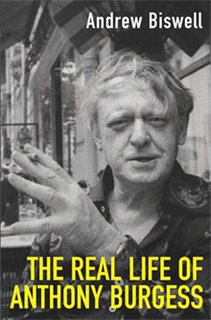
As for what remains, a dozen years after Burgess's death, and the prospects for his reputation, I kept thinking of some momentous, long-ago explosion, far out to sea, whose debris, even now, continues to wash fitfully up upon the lone, lorn 21st-century sands.D J Taylor reviews Andrew Biswell's The Real Life of Anthony Burgess * in the Independent. It's a book I very much want to read, especially after having read Burgess' own biographies, Little Wilson and Big God and You've Had Your Time.
I am an unashamed lover of Burgess as I've said before. I actually chose to be posted to Kuala Kangsar in the '80's because I'd so enjoyed his trilogy and I guess that I was on my own little mission to try to understand him and the Malaya he painted. The town did not disappoint. It had more than its share of remarkable, eccentric characters. The Ubudiah mosque was still "as bulbous as a clutch of onions" and I became a paid-up bar-propping member of the Iblis (oops, sorry the Idris) Club .
But the school where he taught (MCKK) had completely forgotten him. There wasn't a copy of a single one of his books in the library. No plaque on the wall. I pondered on whether this was the result of an embarrassed silence (although Burgess had been even-handedly rude about all the races including the British in his writing) or genuine ignorance and indifference. Concluded the latter.
And of course there is the perfectly understandable desire to shed whatever remnants of the colonial legacy still persist. Merdeka wasn't struggled for for nothing and it isn't PC to honour a British writer. Never mind that he was arguably one of the most important literary figures of the C20th.
And in a the three and a half years I lived there, I met only one person who had known him personally. (Though years later, reading the autobiography, Abu suddenly recalled his housemaster Mr. Wilson ...).
I found this piece written by Tan Sri Abdullah Ahmad recently. It gives, I think another perspective.
* You can win a copy of the new biography in a competition on the Anthony Burgess website.
Saturday, October 29, 2005
The Painful Truth
Giving writing a chance meant risking not being good enough.Juliet Sutcliffe faces the most painful possibility of all on her UEA Creative Writing M.A.
But among the things she learned:
I don't panic when a first draft is drivel (and it is always drivel), and most of all I understand that writing is mostly a question of hard work.
Pamuk on the Novel
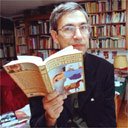 Turkish novelist Orhan Pamuk on the importance on the novel to a society in this piece printed in today's Guardian.
Turkish novelist Orhan Pamuk on the importance on the novel to a society in this piece printed in today's Guardian.Modern societies, tribes and nations do their deepest thinking about themselves through reading novels; through reading novels, they are able to argue about who they are; so even if we have picked up a novel hoping only to divert ourselves, and relax, and escape the boredom of everyday life, we begin, without realising, to conjure up the collectivity, the nation, the society to which we belong.Pamuk himself faces prosecution next month for referring to his country's massacre of the Armenians.This is also why novels give voice not just to a nation's pride and joy, but also to its anger, its vulnerabilities, and its shame. It is because they remind readers of their shame, their pride, and their tenuous place in the world that novelists still arouse such anger, and what a shame it is that we still see outbursts of intolerance - that we still see books burned, and novelists prosecuted.
The Jesper Fanclub
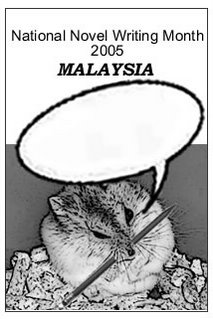
Meet Jesper the Talking Hamster. He's the official mascot for the 2005 Malaysian Nanowrimo and must be woven somewhere into everyone's Nanonovel.
Yes lunacy prevails, and last night we had out first Nanowrimo meet-up in the Booker Room at MPH 1 Utama. Folks came shyly, seriously, a little afraid at first. You could see the words "What am I letting myself in for on? Is it too late to run away?" behind everyone's eyes ...
Around 30 people turned up altogether. (Not bad when so many folks have begun the exodus from the Klang Valley ahead of next week's Deepavali and Hari Raya holidays.) Most were young (youngest 16) but of course there were a couple of us more 'mature' folks and a couple of older gentlemen whom I hope do decide to join us for the long haul. It was great too to meet up with some of the local bloggers including minishorts, eyeris, bawangmerah and Simon.
I answered a few questions about practicalities and then our ML's, Mabel and Erna turned up and took over. They'd put together some goody bags with Jesper's picure on the front, and a Nano survival kit inside which included chocolates and a sheet of ideas for practical suggestions for when you get stuck with your story (Problem: My plot makes absolutely no sense. Solution: Add a dinosaur.)
Mabel got everyone involved in a silly game which well and truly broke the ice, and then everyone introduced themselves and their novels. A comforting number of people said "I have absolutely no idea what my novel's going to be about but I'll just jump in and start writing it anyway." That's the spirit: who needs a plot?
When it was my turn, I told them I fancied writing something Banvillesque this year which got me a few strange looks ...
Erna wanted to record a message from the whole group to send across the world for the next Nanowrimo podcast. Malaysia's message? :
SELAMAT BERNANO!
Friday, October 28, 2005
Birthday Books
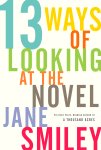
So I had the perfect excuse for guiltless book-buying yesterday, plus a 20% voucher from Times - it being my birthday month and all.
Had been eyeing Jane Smiley's 13 ways at Looking at the Novel for weeks. Smiley, herself a highly successful novelist, bases the book on a list of 100 novels which she felt "would illuminate the whole concept of the novel". It's a pretty eclectic list - covering the wide sweep of the novel's history and taking into account literature in translation. (This time I've read 28 and a half of the books on this list! Even more bookguilt!). Several of my favourite books of all time are listed there, but I don't always see eye to eye about them with Ms. Smiley (which is how it should be!)
I'm going to start reading on Chapter 10 A Novel of Your Own, and am looking forward to learning about her struggles with her own novel in Chapter 12 .
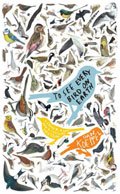 Then another book just flew into my hands. I tell you I was powerless.
Then another book just flew into my hands. I tell you I was powerless.See, I'm a birdwatcher.
A sometimes birdwatcher. An appaulingly bad birdwatcher. An incredibly lazy birdwatcher. A birdwatcher who prefers to sit in my favourite chair on the verandah and let the birds come to me. (But don't knock that - I had a pair of southern pied hornbills in my garden yesterday!)
But I've hung out with some of the best and most addicted guys in the country and have learned at first hand just how thrilling it can be, particularly when you spot a bird that's a first for you and work out for yourself precisely what it is from the field-guide.
In To See Every Bird on Earth: A Father, A Son and a Lifetime Obsession Dan Koeppel describes his father's quest to compile his 'life list'. Richard Koeppel is an obsessive birdwatcher and has travelled to over 60 countries to spot over 7,000 species (The world total is somewhere around 10,000) at great personal and financial cost. It's an obession I understand and can sympathise with, having spent some joyous Sunday mornings in the wilds with members of MNS.
So, some happy reading to do, once I get past the "have to's" on my shelf. During the Nanowrimo month I think I'd rather not have someone else's fiction in my head anyway ...
The Menoporscheal Male
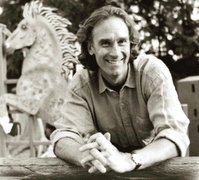
It's a perilous combination for a novelist: overnight success and the male menoporsche. (And no, that wasn't a typo.)
The Horsewhisperer author Nicholas Evans has experienced both reveals Cassandra Jardine in The Age. Evans talks about how his personal experiences have shaped his new novel The Divide.
Thursday, October 27, 2005
Turning Antique!
Indulge me today. I'm getting nostalgic. When I did that meme thing a few weeks ago, I just had too many bits of life left over. Thought I'd use up these bits today.
Thirty years ago:
I was twenty years old and in my first year at a teacher training college in Bromsgrove, Worcestershire. I lodged in nearby Droitwich Spa with another student, a sweet, ditsy girl called Valerie, who drove us to college every morning in her beat up car which we had to push down the hill to get started. Val and I soon asked to be moved to new accomodation when we found ourselves roped in as unpaid babysitters, and the hot water rationed.
Halfway through our first term moved to stay with the Pages, who lived just walking distance from the college in a beautiful big house full of books and were extremely kind to us.
It was a year of discovery for me. The formidable Dr. McGowan was as kindly as she was gruff, but how we quaked in her classes! She introduced us to Eliot, and Conrad, and Patrick White and Browning and William Golding. A buffet of literary excellence to whet our appetites for what we'd be studying later on.
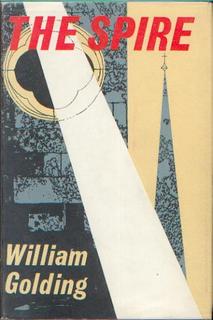
And this was the year I discovered opera. My landlord, Jim Page was the music critic for the Bromsgrove Messenger and got free tickets to all the major performances in Birmingham. In swift succession I got whisked off to The English National Opera's productions of The Ring cycle, Il Travatore, Tosca and was hooked for life.
At weekends I'd hitchhike, not home to see my parents in Meriden, but to The Boyfriend's squalid bedsit in Coventry. He was studying at the School of Music and trying to decide whether to study formal composition or just join a rock band and move to London. My musical education (everything from Joni Mitchell, through Frank Zappa, Soft Machine, and weird experimental jazz to Mozart, Schoenburg and Peter Maxwell Davies) was safe in his hands ... though my heart wasn't. Weekends we'd go to see plays at the Belgrade Theatre or I'd accompany him to concerts where he played clarinet solos with amateur orchestras and wind groups for a little extra cash.
Forty years ago
Ten years old and in Mrs. Marsden's class at St. Edward's Catholic School, Coleshill. Mrs. Marsden believed in strict segregation. Her 44 students were arranged in three islands: Top group, Middle Group and Bottom Group. The boys were seated at her end of the room: the easier to whack them with the ruler if they misbehaved. I was in Top Group, though I feared relegation at any moment - my friends has threatened to rat on me about the ink blots in my science book.
I sat between Linda McCrilley (who always had this stale smell about her because her dad owned a pig farm and she helped with the swill before coming to school), and my best friend Deirdre who was my mentor in shop-lifting.
We started the day with Hail Mary and Our Father, catechism class ("Who made you?" "God made me"), recitation of times tables, and a fifteen minute burst of mental arithmatic. We listened to schools' programmes broadcast on the BBC during the music and science periods, and heard Homer's wonderful Odyssey in episodes. Mrs. Marsden taught everything apart from music when we were dragged over to the hall by Mrs. Pendlebury to sing "The sun is a-coming to welcome the day, Hey ho come to the fair” while she bashed at the piano.
On Friday afternoons were my favourites We had painting and we were all jealous of the mournful Margaret Downs when Mrs. Marsden praised the maturity of her work. She painted all her pictures (whether of the Annunciation or Cyclops' cave) solely in moody red and black.
Play times were always spent with gap-toothed Laureen Howard, saving the treasures of Atlantis from the bottom of a tropical ocean, or piloting Thunderbirds 8 for International Rescue, or swapping the Man from Uncle cards which came free with squares of pink bubblegum.
I dawdled home as slowly as possible with Deidre, each of us daring the other into new dangers after school. I stopped the dare business after a particularly hairy escapade left me hanging for dear life by my fingertips on the outside struts of a bridge with a twenty-foot drop and a rushing river beneath me. Good job my over-protective mum never knew.
My family was living temporarily in a postwar prefabricated house (the malaysian equivalent would surely be 'low cost') at the bottom of the hill, while our new house (designed by my dad) was being built.
It was a year of Enid Blyton. I devoured the Malory Towers series in preparation, I thought, for how things would be at my secondary school.
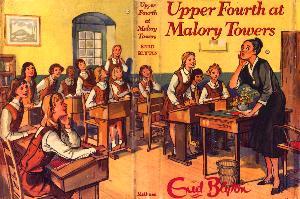
50 years ago (today)
Sharon Joyce Young born at St Francis Private Hospital to Leonard James Young (Road Engineer) and Kitty Ella Young (formerly Turner) of 21 Abbey Drive, Leicester. With a whole lot of memories in my head that couldn't possibly be mine.
Today I have become an antique!
Thirty years ago:
I was twenty years old and in my first year at a teacher training college in Bromsgrove, Worcestershire. I lodged in nearby Droitwich Spa with another student, a sweet, ditsy girl called Valerie, who drove us to college every morning in her beat up car which we had to push down the hill to get started. Val and I soon asked to be moved to new accomodation when we found ourselves roped in as unpaid babysitters, and the hot water rationed.
Halfway through our first term moved to stay with the Pages, who lived just walking distance from the college in a beautiful big house full of books and were extremely kind to us.
It was a year of discovery for me. The formidable Dr. McGowan was as kindly as she was gruff, but how we quaked in her classes! She introduced us to Eliot, and Conrad, and Patrick White and Browning and William Golding. A buffet of literary excellence to whet our appetites for what we'd be studying later on.

And this was the year I discovered opera. My landlord, Jim Page was the music critic for the Bromsgrove Messenger and got free tickets to all the major performances in Birmingham. In swift succession I got whisked off to The English National Opera's productions of The Ring cycle, Il Travatore, Tosca and was hooked for life.
At weekends I'd hitchhike, not home to see my parents in Meriden, but to The Boyfriend's squalid bedsit in Coventry. He was studying at the School of Music and trying to decide whether to study formal composition or just join a rock band and move to London. My musical education (everything from Joni Mitchell, through Frank Zappa, Soft Machine, and weird experimental jazz to Mozart, Schoenburg and Peter Maxwell Davies) was safe in his hands ... though my heart wasn't. Weekends we'd go to see plays at the Belgrade Theatre or I'd accompany him to concerts where he played clarinet solos with amateur orchestras and wind groups for a little extra cash.
Forty years ago
Ten years old and in Mrs. Marsden's class at St. Edward's Catholic School, Coleshill. Mrs. Marsden believed in strict segregation. Her 44 students were arranged in three islands: Top group, Middle Group and Bottom Group. The boys were seated at her end of the room: the easier to whack them with the ruler if they misbehaved. I was in Top Group, though I feared relegation at any moment - my friends has threatened to rat on me about the ink blots in my science book.
I sat between Linda McCrilley (who always had this stale smell about her because her dad owned a pig farm and she helped with the swill before coming to school), and my best friend Deirdre who was my mentor in shop-lifting.
We started the day with Hail Mary and Our Father, catechism class ("Who made you?" "God made me"), recitation of times tables, and a fifteen minute burst of mental arithmatic. We listened to schools' programmes broadcast on the BBC during the music and science periods, and heard Homer's wonderful Odyssey in episodes. Mrs. Marsden taught everything apart from music when we were dragged over to the hall by Mrs. Pendlebury to sing "The sun is a-coming to welcome the day, Hey ho come to the fair” while she bashed at the piano.
On Friday afternoons were my favourites We had painting and we were all jealous of the mournful Margaret Downs when Mrs. Marsden praised the maturity of her work. She painted all her pictures (whether of the Annunciation or Cyclops' cave) solely in moody red and black.
Play times were always spent with gap-toothed Laureen Howard, saving the treasures of Atlantis from the bottom of a tropical ocean, or piloting Thunderbirds 8 for International Rescue, or swapping the Man from Uncle cards which came free with squares of pink bubblegum.
I dawdled home as slowly as possible with Deidre, each of us daring the other into new dangers after school. I stopped the dare business after a particularly hairy escapade left me hanging for dear life by my fingertips on the outside struts of a bridge with a twenty-foot drop and a rushing river beneath me. Good job my over-protective mum never knew.
My family was living temporarily in a postwar prefabricated house (the malaysian equivalent would surely be 'low cost') at the bottom of the hill, while our new house (designed by my dad) was being built.
It was a year of Enid Blyton. I devoured the Malory Towers series in preparation, I thought, for how things would be at my secondary school.

50 years ago (today)
Sharon Joyce Young born at St Francis Private Hospital to Leonard James Young (Road Engineer) and Kitty Ella Young (formerly Turner) of 21 Abbey Drive, Leicester. With a whole lot of memories in my head that couldn't possibly be mine.
Today I have become an antique!
Wednesday, October 26, 2005
Judged by the Cover
The debate about the snob value of books continues in the Guardian with some timely advice delivered by John Sutherland. If you want to impress in Britain:
The best question to ask when not sure whether to purchase that new book or not:
"Never, never, never be seen with a book which has a "3 for 2" or "£6 off" discount sticker on it."(On the other hand fellow Malaysians might be impressed with your canny shopping skills.)
The best question to ask when not sure whether to purchase that new book or not:
"Does my sensibility look big in this?"I think I looked rather fetching in the Bukowski.
A Single Emblematic Moment to Catch the Whole
Neither novel. Nor poem.
Yet sharing much with both.
A lovely hybrid form,
which catches people
at crucial moments of their lives
and snaps them.
A whole life in a few pages.
Huge dilemmas packed
Into a small moment
of belief.
Yet sharing much with both.
A lovely hybrid form,
which catches people
at crucial moments of their lives
and snaps them.
A whole life in a few pages.
Huge dilemmas packed
Into a small moment
of belief.
Of course you guessed the nature of the "lovely hybrid". Leon has some excellent quotes from writer Jackie Kay which you should engrave on your heart if you write in this form.
Reprise : Air and Light and Time and Space
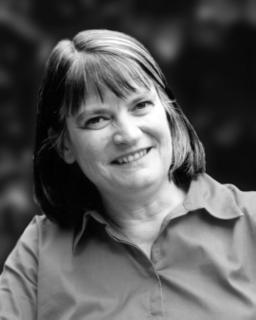
To revive an old theme - those folks who say they simply do not have time to spare to write their magnum opus could learn a thing or too from Clare Morrall's example.
You may remember that Morrall was shortlisted the 2003 Booker with Astonishing Splashes of Colour, published by the independent Tindal Street Press.
Morrall works full-time as a music teacher in a Birmingham primary school and gives lessons to her older pupils after school hours.
The Bookseller reports:
For a long time, her writing was fitted around a very demanding schedule of both teaching and single-handedly bringing up her two daughters, now in their 20s, following a divorce. ... Writing was fitted in as best she could: "When the children were little there were early bedtimes, but that didn't last too long. For a time all I had was one morning a week for a couple of months and the occasional Saturday afternoon when they all went off with their father. So it was very difficult to squeeze it in. but I just got on with it. A lot of people talk about how they want to be a writer, but if you want to be a writer, you do it."She works at the house of one of the other women from her school because she feels the need to get away from her own house to write: "She has this wonderful big house, so I can go up to the top floor and sit there on my own."
Tuesday, October 25, 2005
Nanuts in Star Two!
The lovely Michael Cheang has penned a very nice feature about the local Nanowrimo for Star Two. It nicely captures the general sense of insanity and I hope the publicity will get many more folks enthused.
(Small factual inaccuracy though - there were 40 Malaysian participants last year and 10 winners.)
The first meet-up is scheduled for this Friday (Oct 28), at 7pm in the Booker Room of MPH 1-Utama, Petaling Jaya.
If you want to take part, register at the official website and then check out the official Malaysian NaNoWriMo blog.
Hmmm ... looks like our ML Erna already has a photo for her book jacket!
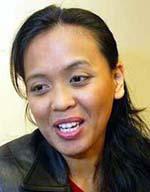
(Small factual inaccuracy though - there were 40 Malaysian participants last year and 10 winners.)
The first meet-up is scheduled for this Friday (Oct 28), at 7pm in the Booker Room of MPH 1-Utama, Petaling Jaya.
If you want to take part, register at the official website and then check out the official Malaysian NaNoWriMo blog.
Hmmm ... looks like our ML Erna already has a photo for her book jacket!

Publishing as Self-induced Misery
Get yourself published and your woes are over? Writes Elizabeth Royte in the New York Times:
... the contemporary author trudges along a predictable path that can only be described, in hindsight, as self-induced misery ...If you wannabe-publisheds aren't sufficiently depressed by the end of the article, you might like to go back to this post!
Pretentious? Moi?
Want to look more intelligent than you really are? Quick, grab a book!
Says John Ezard in the Guardian:
Says John Ezard in the Guardian:
Books are the new snobbery, according to a survey today. Social competitiveness about which titles we read has become one of the new mass forces of the era and only middle-aged people are relatively free of it.Okay ...but it might not work here in Malaysia. Who is going to be impressed to see you posing around with the latest prize-winning title as you strap hang on the LRT? I get strange looks all the time when I read in public ...
Driven partly by pressure from incessant literary prize shortlists, more than one in three consumers in London and the south-east admit having bought a book "solely to look intelligent", the YouGov survey says.
It finds one in every eight young people confessing to choosing a book "simply to be seen with the latest shortlisted title". This herd instinct dwindles to affect only one in 20 over-50 year-olds.
"The latest literary pressure is keeping up with the rest of your fellow travellers and commuters. Bookshelf contents are fast becoming as studied and planned as outfits as a way to impress others. Books shortlisted for prestigious literary panel awards are becoming 'de rigueur' reading for many."
Monday, October 24, 2005
After Hunter

A very poignant interview with Hunter S. Thompson's widow, Anita from The Observer.
Just bought a copy of Fear and Loathing in Las Vegas.
The Author Photo
Should we get rid of author photos on bookcovers?
Bookslut links to Frances Wilson's piece in the Guardian.
The author photo on the inside cover of a book is a fairly recent innovation and clearly reflects the celebrityisation of contemporary culture. Author as commodity to be sold. (The same has happened with musicians on the cover of classical music CD's over the years ...)
Male authors, says the article, have it easier as "like dentists" they:
I love the craggier faces of older women writers (Proulx, Bainbridge, Lessing, Rubens) who've clearly lived life to the full and arrived in their own skin without apologies. Truly the most transforming cosmetic a woman can put on her face is intelligence!
Wilson talks about how "wincingly awkward" it was posing for her own author photo. (Her latest book is The Courtesan's Revenge.)
I sort of had a taste of the same the other day with Marisa chasing me round Silverfish with a camera for a profile picture for chrome. The whole process simultaneously flattering and terrifying. In the end I decided that the best pose was one with a book covering my face. If it turns out well I'll show it to you another day.
(Liked the Guardian's rather irreverent approach to the author photo in their earlier competition!)
Bookslut links to Frances Wilson's piece in the Guardian.
The author photo on the inside cover of a book is a fairly recent innovation and clearly reflects the celebrityisation of contemporary culture. Author as commodity to be sold. (The same has happened with musicians on the cover of classical music CD's over the years ...)
Male authors, says the article, have it easier as "like dentists" they:
... should be both trusted and feared. Fanning out a handful of blue Pelican popular philosophy books from the 1950s, one encounters on the back a series of passport-sized pictures showing granite-faced, set-jawed gentlemen in late middle age, accessorised with a pipe, a thistly tweed jacket or patent leather hair. Their appeal to the reader could not be described as obviously erotic but we know we are in the hands of a sturdy thinker. A diluted version of the same approach can often be found in the author photos of contemporary male novelists, although the pipe has become metaphorical and moleskin is the new tweed. The face is crevassed with shadow, propped up on a fist, the brow furled.The woman writer on the other hand, "must be able to do more than spin a sentence together". She notes that Zadie Smith's inside-flap picture:
... was by far the largest image among this year's Booker-shortlisted novels and the only one in colour. It is hard to see how it could not impact on readers' impressions of her work. The fabulously groomed mane and decidedly unfurled brow of the "highly promotable" woman writer, of which Smith's image is an iconic example, is not only guaranteed to stir up a tangy mixture of aspiration, desire and envy; it is also a distraction from the compact between reader and writer.Now I actually approve wholeheartedly of the author photo on the bookcover ... it's fun to try to work out what kind of people the writers are and whether you think you'd actually warm to them in real life. But literature ain't a beauty contest!
I love the craggier faces of older women writers (Proulx, Bainbridge, Lessing, Rubens) who've clearly lived life to the full and arrived in their own skin without apologies. Truly the most transforming cosmetic a woman can put on her face is intelligence!
Wilson talks about how "wincingly awkward" it was posing for her own author photo. (Her latest book is The Courtesan's Revenge.)
I sort of had a taste of the same the other day with Marisa chasing me round Silverfish with a camera for a profile picture for chrome. The whole process simultaneously flattering and terrifying. In the end I decided that the best pose was one with a book covering my face. If it turns out well I'll show it to you another day.
(Liked the Guardian's rather irreverent approach to the author photo in their earlier competition!)
Sunday, October 23, 2005
The EVO Approach
Thought this a nice addition to the discussion of getting kids to read I got so carried away with yesterday ...
Daphne Lee in her Tots To Teens column in Starmag today talks about the EVO Approach:
Daphne Lee in her Tots To Teens column in Starmag today talks about the EVO Approach:
OK, those of you who read this column regularly are probably saying, “Oh, no, there she goes again. She sounds like a broken record.” Well, I’m also writing Tots to Teens for people who have only just come across it; new parents maybe; or educators; people who would like to nurture the reading habit in their little ones, or people who are simply interested in promoting literacy, and who maybe need help in figuring out what they can do to make a difference.EVO? It's a winning formula!
And so ... EVO! This is a little something I’ve come up with to act as a simple guide to what you need to give children if you want them to love reading and books. Exposure. Variety. Own choice. EVO!
To elaborate: Kids need to be surrounded by books and reading from the word go; they need to know that there are lots of different kinds of books out there for their enjoyment, not just, say, mysteries or fairytales or, heaven forbid, workbooks. And they need to be allowed to say, “I don’t really fancy J.K. Rowling. Give me Louisa Alcott instead.” Or vice versa.
Of course, the sooner they experience all of the above, the better. Above all else, read, read and read to your kids. At bedtime is always nice, but if little Jon crawls into your lap first thing in the morning and hands you Dr Seuss, seize the moment and run with it. And if you’re too tired, you can just look at the pictures together.
The 100 Greatest Novels!
I just love booklists! TIME magazine features a list of the top 100 novels published since 1923. The urge to compare one's bookaddled self against such a list is irresistible.
I scored 33 and a half (I left Atonement half-way through distracted by other books I had to read!) and feel significant amounts of bookguilt about the 66 and a half I need to make a start on.
Of course any list is subjective. This one is weighted towards American writing. There's an interesting discussion going where readers talk about the books that should be on the list.
I scored 33 and a half (I left Atonement half-way through distracted by other books I had to read!) and feel significant amounts of bookguilt about the 66 and a half I need to make a start on.
Of course any list is subjective. This one is weighted towards American writing. There's an interesting discussion going where readers talk about the books that should be on the list.
Saturday, October 22, 2005
Index: On the Local Writing Scene
- Issues
- Telling Tales (21/3/05)
- Giving Writers a Chance (18/5/05)
- Writers' Centre (19/5/05)
- A Lazy Colony of Silverfish? (15/5/05)
- Pitching In (30/6/05)
- Writers Don't Say No-one does Nuffink for You (30/6/05)
- Kutu Kutu (6/2/05)
- The Book Project (30/7/05)
- Toyols Steal the Reading Public (29/7/05)
- Representing Thailand on the Page (2/8/05)
- Recognising Local Writers (19/8/05)
- South of the Border, West of the Lit World (28/7/05)
- Is There a Market for Malaysian Fiction in English? (21/8/05)
- Write in English? Don't be So Disloyal! (22/8/05)
- Dream Ink at the Singapore Writers' Festival (5/9/05)
- The Silverfish Bug (18/9/05)
- Kee Principles (17/9/05)
- Local Writers' Manifesto (20/9/05)
- The Literary Landscape of Singapore (7/10/05)
- A Toast to Mr. Wong (13/10/05)
- Local Authors Outsell the Da Vinci Code (26/2/05)
- New Voices (24/3/06)
- International Literary Society for KL (4/7/06)
- Malaysian PEN? (5/7/06)
- Readings by Local Writers (at Darling Muse/ 67 Jalan Tempinis 1/ Maya Gallery/ La Bodega/ Silverfish)
- Readings at Darling Muse (5/1/05)
- Oh Darling Muse! (9/1/05)
- Saturday Perambulations (20/3/05)
- A Surfeit of Readings (17/4/05)
- A New Home for Words (22/5/05)
- 67 Jalan Tempinis 1 Strikes Again (22/6/05)
- Brown Sugar and Special Branch (26/6/05)
- Winning Wimmin (31/7/05)
- Captured! (1/8/05)
- Occasional Nudist Pumps Deltoids On the Road to Elvis (25/9/05)
- Painted Piggies, Winging Words (30/9/05)
- Nice One, Cecil (14/11/05)
- Inky Little Fingers (19/11/05)
- Rain and Readings (20/11/05)
- Pictures from Reading at Maya Gallery (24/3/06)
- Shirley Shines (25/3/06)
- Saturday in Photos (21/5/06)
- MPH Writer's Circle:
- MPH Writers' Circle (16/1/05)
- Distribution (20/2/05)
- Saturday Perambulations (20/3/05)
- Print on Demand (22/5/05)
- Tash Dash (18/6/05)
- One Aw-Some Day (26/6/05)
- Drifting Characters in Search of a Plot (16/7/05)
- Write a Novel in a Month (5/8/05)
- NaNoTechnology (21/8/05)
- Short Notice Writers' Circle (17/3/06)
- Round and Round in Circles (19/3/06)
- Saturday in Photos (21/5/06)
- Sneaking in the Fiction Agenda (16/6/06)
- Generating Income from Fiction (18/6/06)
- Self-Serving Great Grandmother's Dishes (15/7/06)
Catch 'Em Young
Bound up for many years with the problems and shortcomings in the education system here, I sometimes lose sight of the fact that things are not going so swimmingly in British schools.
It's very upsetting to realise that newer curriculm innovations are undermining the progress of the past: the highly prescriptive National Literacy Strategy with it's emphasis on measurable results and test scores clearly is not working. (Actually I'm resisiting the urge to say "I told you so." Because anyone with that rare commodity, common-sense, could have seen this coming.)
The Bookseller reports that a report produced last week:
Sideline the joy of books and you don't get readers further down the line, it's as simple as that. No market for books. No writers of note.
And that is what is very largely going wrong in Malaysia too. We lack a reading culture here because kids have not learned to love books at school. School libraries are hopelessly understocked for the most part. The scope of classreader programmes limited. The set texts for examinations ... well let's just say that they are a little uninspiring and leave it at that for today because it's a hobby-horse I may not get off for a very long time. (Another day, then ...)
The kids who do learn to love books here do so, by and large, because their parents value books, read to them and take them to bookshops and libraries. Not because of what's happening in schools.
(I wrote, with very mixed feelings, sometime ago about one intitiative to put books in the hands of kids in schools.)
I think too that the local bookshops need to play a more proactive role in promoting books for children.
I was talking one day to a marketing manager of one of the bigger bookstores. He was complaining about parents parking their kids in the store while they went off shopping. The children did their "free-reading" (that great Malaysian pastime!) and then left the books lying, a little soiled and dog-eared all over the place. Why not, I said, encourage the free reading? Put piles of fun books out for kids to pick up and read and rejoice in the fact that they're in your shop and picking up books at all? Why not have some friendly clued-up folks to help the kids find books they'd like to read? Okay, so you might not make a sale today. But the process of becoming a bookworm is insiduous. Today's noisy little terrors are tomorrow's hopeless bookaholics. You are growing your customer base by caring for your youngest readers.
I'm thinking a lot about kid's books at the moment because I'm working on a very long list of children's titles to buy for The British Council library over the next few months ...
It's very upsetting to realise that newer curriculm innovations are undermining the progress of the past: the highly prescriptive National Literacy Strategy with it's emphasis on measurable results and test scores clearly is not working. (Actually I'm resisiting the urge to say "I told you so." Because anyone with that rare commodity, common-sense, could have seen this coming.)
The Bookseller reports that a report produced last week:
... made depressing but predictable reading. The five-year study of English teaching in schools found nearly a third of all primary lessons "no better than satisfactory"; a fifth of children starting secondary school fail to reach the minimum standard of literacy expected for their age; and--important for publishers--schools are still failing to inspire children to read independently or for pleasure.The article quotes children's author Bernard Ashley : "If children aren't enjoying and wanting books at seven, they aren't going to be rushing out and buying them at 21. ... If you set a restricted diet of targets in reading and writing--the back to basics appeal to middle England--you get culturally undernourished children."
Sideline the joy of books and you don't get readers further down the line, it's as simple as that. No market for books. No writers of note.
And that is what is very largely going wrong in Malaysia too. We lack a reading culture here because kids have not learned to love books at school. School libraries are hopelessly understocked for the most part. The scope of classreader programmes limited. The set texts for examinations ... well let's just say that they are a little uninspiring and leave it at that for today because it's a hobby-horse I may not get off for a very long time. (Another day, then ...)
The kids who do learn to love books here do so, by and large, because their parents value books, read to them and take them to bookshops and libraries. Not because of what's happening in schools.
(I wrote, with very mixed feelings, sometime ago about one intitiative to put books in the hands of kids in schools.)
I think too that the local bookshops need to play a more proactive role in promoting books for children.
I was talking one day to a marketing manager of one of the bigger bookstores. He was complaining about parents parking their kids in the store while they went off shopping. The children did their "free-reading" (that great Malaysian pastime!) and then left the books lying, a little soiled and dog-eared all over the place. Why not, I said, encourage the free reading? Put piles of fun books out for kids to pick up and read and rejoice in the fact that they're in your shop and picking up books at all? Why not have some friendly clued-up folks to help the kids find books they'd like to read? Okay, so you might not make a sale today. But the process of becoming a bookworm is insiduous. Today's noisy little terrors are tomorrow's hopeless bookaholics. You are growing your customer base by caring for your youngest readers.
I'm thinking a lot about kid's books at the moment because I'm working on a very long list of children's titles to buy for The British Council library over the next few months ...
Friday, October 21, 2005
Still Howling After All These Years
 It's fifty years this month since one of the most influential and widely read poems ever was written:
It's fifty years this month since one of the most influential and widely read poems ever was written: Howl by Allen Ginsberg.
A poem he intended as an "emotional time bomb that would continue exploding". And has.
A song of spiritual liberation, a homage to art, an ode to gay love and a lament for his mentally ill mother.
A great turning point for poetry. Capturing the rebellious, hungry, anguished voice of disillutioned youth. Capturing the vernacular speech of the people. Talking straight to the heart.
Performed. Not dead on the page. Not consigned to ivory towerdom. At a time when poets just didn't read their work aloud.
Provoked a storm of moral outrage in America. Was the subject of an obscentity trial.
That's an awful lot for one poem to do.
So celebrate.
Go print off a copy.
Go into the bathroom.
Read it aloud to feel the energy bouncing off the tiled walls.
Vibrating off bathtaps.
Feel it reverberate in the words you pen after. Writing from the deep and dangerous and angry and true place inside yourself. Which is the only place you have any right to write from.
In a strange attack of synchronicity I came across Ginsberg's essays Deliberate Prose by the bread counter in Cold Storage (RM9.90!) a few days ago. This is what he said about writing Howl.
I thought I wouldn't write a poem, but just write what I wanted to without fear, let my imagination go, open secrecy and scribble magic lines from my real mind - sum up my life - something I wouldn't be able to show anybody, writ for my own soul's ear and a few other golden ears. ... the first section typed out madly in one afternoon, a tragic custard-pie comedy of wild phrasing, meaningless images for the beauty ...
You can read more about the poem and the waves it created here.
You can listen to NPR's programme about Howl here and hear Ginsberg read his lines.
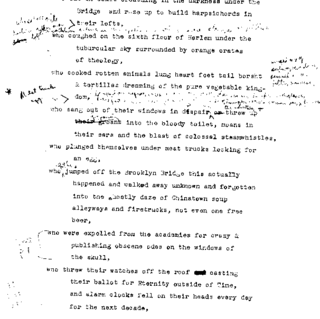
Thursday, October 20, 2005
Reading Romesh
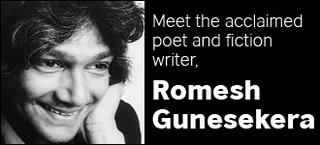
Novelist Romesh Gunesekera is going to be in KL next month, his visit sponsored by The British Council. He's participating in the Worlds in Discourse conference organised by Universiti Kebangsaan Malaya (UKM) from 21-23 November.
Mark down 24th November in your diaries because that's when he's going to be reading from a selection of his works at Silverfish on at 7 p.m. .
Romesh was born in 1954 in Sri Lanka and moved to England in 1971. His first novel, Reef (1994), won a Yorkshire Post Book Award (Best First Work) and was shortlisted for both the Booker Prize for Fiction and the Guardian Fiction Prize. You can read more about him and his works here.
I had had Reef sitting on my 'to be read' shelf for a very long time. (More bookguilt!) I picked it up the other day and am really enjoying it. (And it's short - only 190 pages in an age where litfic always seems to be bloated!)
I managed to pick up copies of his Monkfish Moon and The Sandglass at Silverfish. Raman has brought in copies from India so they are a bit cheaper. Guess who's busy doing her homework right now?
Wednesday, October 19, 2005
Malaysia's Very Own Katherine Hepburn?
Yeah, sure.
Aneeta asked me to do an e-mail interview for her and I'm just sorry that she had to keep chasing me to get it finished. So if you're curious to know a bit more about this strange mat salleh, follow the trail of breadcrumbs to Aneeta's site.
Check out some of the other interesting articles and interviews too while you're there.
Aneeta asked me to do an e-mail interview for her and I'm just sorry that she had to keep chasing me to get it finished. So if you're curious to know a bit more about this strange mat salleh, follow the trail of breadcrumbs to Aneeta's site.
Check out some of the other interesting articles and interviews too while you're there.
Kakiseni at Alexis
Last night Kakiseni threw a bash at Alexis for contributors. The online arts magazine is growing from strength to strength (now it gets 19,000 page views a day). It's one of my favourite places to hangout online - the articles are intelligent (have to be, I write for them, right?) and the comments readers leave spark off some great debate about the state of the arts here.
You know me, hey. I love parties. I'm happiest in a crowd of folks I can really talk to. I hunger like mad for conversation about books, about the arts in general. About the direction things are taking.
Sorry if what follows sounds like the social pages of Harper's or something!
Of course, met a lot of good friends, among them Kakiseni editor Pang, Jerome, Zedeck, and Bernice.
Kathy Rowland (who got voted sexiest kakiseni writer slightly ahead of Zedeck - snap him up for modelling, someone!) and Jenny Daneels co-founders and co-directors of Kakiseni were of course there. Chatted to that lovable eccentric Hishamuddin Rais. Nodded in the direction of Ray Langenbach (can't look at him in the same way since I read about him drinking his own blood in Hishamuddin's article). Had a long and fascinating conversation with Toni of Sisters in Islam, an organisation I very much admire. Chatted to Tony Twigg, currently artist in residence at Rimbu Dahan, and his wife Gina Fairley.
Also made the aquaintance of the very inspiring Benjamin McKay who is researching the history of the Malay film for his PhD. thesis. We were talking about the parallels between indie film-making and the local publishing scene (small presses, self-publishing). Agree with him that we need a lot of "so-so stuff" out there because that is where the potential will develop. ("But not crap, crap is worth condemning.")
Came away with tummy nicely full (hope no-one noticed me in embarrassingly close proximity to the mini-pavlovas for much of the evening!) and a heart newly inspired.
Okaylah, might even write another article!
You know me, hey. I love parties. I'm happiest in a crowd of folks I can really talk to. I hunger like mad for conversation about books, about the arts in general. About the direction things are taking.
Sorry if what follows sounds like the social pages of Harper's or something!
Of course, met a lot of good friends, among them Kakiseni editor Pang, Jerome, Zedeck, and Bernice.
Kathy Rowland (who got voted sexiest kakiseni writer slightly ahead of Zedeck - snap him up for modelling, someone!) and Jenny Daneels co-founders and co-directors of Kakiseni were of course there. Chatted to that lovable eccentric Hishamuddin Rais. Nodded in the direction of Ray Langenbach (can't look at him in the same way since I read about him drinking his own blood in Hishamuddin's article). Had a long and fascinating conversation with Toni of Sisters in Islam, an organisation I very much admire. Chatted to Tony Twigg, currently artist in residence at Rimbu Dahan, and his wife Gina Fairley.
Also made the aquaintance of the very inspiring Benjamin McKay who is researching the history of the Malay film for his PhD. thesis. We were talking about the parallels between indie film-making and the local publishing scene (small presses, self-publishing). Agree with him that we need a lot of "so-so stuff" out there because that is where the potential will develop. ("But not crap, crap is worth condemning.")
Came away with tummy nicely full (hope no-one noticed me in embarrassingly close proximity to the mini-pavlovas for much of the evening!) and a heart newly inspired.
Okaylah, might even write another article!
Tuesday, October 18, 2005
If You Want to Break Into Films
Razlina from 95% Writer's Academy e-mailed me yesterday to say that she will be starting the next Story Writers in Progress training after Raya. There is apparently a special discount of RM200 on the fees if you sign up on Saturday. You might just want to drop by anyway as the academy is hosting a couple of talks:




It's A Crime!
If Dickens were alive today he would be writing genre fiction or churning out soaps for TV.Discuss with reference to at least five episodes of CSI London.
Okay, okay I'm being completely fascetious. I'm as guilty as anyone. of not taking genre fiction as seriously as that which we dub *"literary fiction" a.k.a. the real stuff, the hardcore.
The Guardian yesterday quite rightly rapped my pretentious knuckles:
What is it, when Man Booker juries meet, that makes genres "inferior"? ... Why is crime writing, with its "very conscious structure" and ability to raise "big moral issues" outside the box of introversion, such a poor relation of "literary fiction"?Truth is, a "very conscious structure" to me reeks of predictability and formulaic writing.
Give me genre fiction that subverts the genre and I will be thrilled. Just as I'm thrilled to read the "literary" novel which breaks new ground.
Give me an elegantly turned plot, language that's so rich I want to drink it, characters I can care about, deeper issues to keep me awake at night just wondering, wondering. And I won't care what kind of fiction you call it.
 There are crime writers who manage it. Patricia Highsmith's The Talented Mr. Ripley, for example, caught me completely off balance - how does she get the reader to side with the truly despicable Ripley? Yet we do. And in the process are forced to confront our own definitions of "moral behaviour".
There are crime writers who manage it. Patricia Highsmith's The Talented Mr. Ripley, for example, caught me completely off balance - how does she get the reader to side with the truly despicable Ripley? Yet we do. And in the process are forced to confront our own definitions of "moral behaviour". Yet I really don't think it's true to say there is no genre fiction on Booker shortlists - it's just that the kind of authors who make it that far tend to play with the narrow definitions of genre. Is Margaret Atwood's The Blind Assassin science fiction or detective story? Both and more.
Yet I really don't think it's true to say there is no genre fiction on Booker shortlists - it's just that the kind of authors who make it that far tend to play with the narrow definitions of genre. Is Margaret Atwood's The Blind Assassin science fiction or detective story? Both and more.Atwood has also written some of the best "speculative" fiction (i.e. sci-fi that could happen) - the chilling Oryx and Crake (nightmares free of charge) and The Handmaid's Tale (so prophetic in it's vision of the religious extremism sweeping America).
Cloud Atlas by David Mitchell on last year's shortlist wraps a story within a story within a story and incorporates several genres - thriller, fantasy, comedy ... and each one superb.
Julian Barnes Arthur and George is a historical novel which is also centres on the solving of a crime.
 Susanna Clarke's Jonathan Strange and Mr. Norrell was not only shortlisted for the Booker but also also bagged the Hugo award for science ficition writing and the Mythopoetic award for fantasy.
Susanna Clarke's Jonathan Strange and Mr. Norrell was not only shortlisted for the Booker but also also bagged the Hugo award for science ficition writing and the Mythopoetic award for fantasy.In the end it isn't so much a choice between Literary fiction and genre, as between the straightforward and fomulaic and the multilayered and surprising.
I know which I'd rather have!
(*By the way, hadn't really realised until Tash's talk at Silverfish that American fiction does not recognise such artificial distinctions.)
Postscript:
Even deep-end litfic types dabble in genre. The Elegant Variation has the news that Banville is headed in that direction next.
Monday, October 17, 2005
Fallen City
 Here's a book I didn't enjoy at all. Didn't even finish it - wimped out a little over halfway with only a feeling of relief.
Here's a book I didn't enjoy at all. Didn't even finish it - wimped out a little over halfway with only a feeling of relief.The City of Falling Angels is set in Venice and revolves around the author's inquiry into the fire which destroyed the Fenice Opera House. Along the way he meets all kinds of eccentrics (feuding glassblowers, rat catchers, itinerant plant salesman, American expats) and paints an unflattering portrait of the city's underbelly. Berendt uncovers some fascinating material but fails to make the most of it - it reads like background research waiting for a novel to happen. But the writing plods and is at times dismaying clumsy.
I also can't fathom why there are no pictures at all. Is it just assumed that we know our way around the architecture and geography of Venice? I certainly don't.
Berendt is best known for his Pulitzer winning Midnight in The Garden of Good and Evil his 1994 book (non-fiction but with some invented scenes!) about a murder in Savannah, Georgia. I have a copy on my shelves but haven't yet read it. There was also a film made of it. This time though, he doesn't get the formula right.
Can't help thinking that it would be fun to write a non-fiction novel like this about another historical city slowly sinking into the mud of ineptitude and indifference - our own Malacca.
Kunzru Makes An Impression
Last Monday night it was my turn to host supper for my book club buddies and the book under discussion was The Impressionist by Hari Kunzru.
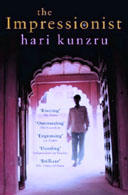
I was a bit shamefaced because I hadn't quite got to the end (had to read other stuff for review and am not the fastest anyway, especially when I'm enjoying the writing). By unanimous verdict the book was declared excellent.
Now that doesn't happen all that often ... the last time this happened was with Rohinton Mistry's A Fine Balance and the time before that with Barbara Kingsolver's The Poisonwood Bible.
The Impressionist is about a half-cast boy, conceived during a flash flood when his forester father is rescued by a young woman on her way across the desert to her arranged marriage. (Not very a likely occurrence? Far crazier things happen in this book, be warned.)
Pran is brought up in luxury and revered for his fair skin, but when his true parentage is revealed, he is cast out onto the streets to fend for himself. A born-survivor, the boy takes on different identities and reinventing himself at every turn. He makes an epic journey through the turbulent Indian subcontinent, and later to England and West Africa.
The Impressionist is a hilarious romp of a book, wonderfully farcical. It's richly imagined, and replete with historical detail. The characters are delightfully eccentric - the British coming off particularly badly (as they surely deserve to).
It's a novel about empire, but also about identity. And it sparked off good discussion about racial identity and "fitting in" in the Malaysian context.
Yes, this one comes very highly recommended.

I was a bit shamefaced because I hadn't quite got to the end (had to read other stuff for review and am not the fastest anyway, especially when I'm enjoying the writing). By unanimous verdict the book was declared excellent.
Now that doesn't happen all that often ... the last time this happened was with Rohinton Mistry's A Fine Balance and the time before that with Barbara Kingsolver's The Poisonwood Bible.
The Impressionist is about a half-cast boy, conceived during a flash flood when his forester father is rescued by a young woman on her way across the desert to her arranged marriage. (Not very a likely occurrence? Far crazier things happen in this book, be warned.)
Pran is brought up in luxury and revered for his fair skin, but when his true parentage is revealed, he is cast out onto the streets to fend for himself. A born-survivor, the boy takes on different identities and reinventing himself at every turn. He makes an epic journey through the turbulent Indian subcontinent, and later to England and West Africa.
The Impressionist is a hilarious romp of a book, wonderfully farcical. It's richly imagined, and replete with historical detail. The characters are delightfully eccentric - the British coming off particularly badly (as they surely deserve to).
It's a novel about empire, but also about identity. And it sparked off good discussion about racial identity and "fitting in" in the Malaysian context.
Yes, this one comes very highly recommended.
Sunday, October 16, 2005
Beryl On Bernice
 A very moving and funny tribute in the Guardian by Beryl Bainbridge writing about her friend, the writer Bernice Rubens who died last year.
A very moving and funny tribute in the Guardian by Beryl Bainbridge writing about her friend, the writer Bernice Rubens who died last year.Some of our closeness was due to a certain similarity in the way our lives had begun, and progressed. As children we had both felt out of step, told lies, felt we were hard done by. As adults we had loved the men we married and they had walked away, crashing our hopes, after which we had gone in for gentleman callers. Both of us used fiction to make sense of the past. Both of us believed that had we been happier neither of us would have needed to write. The title of her memoir, When I Grow Up, is apt; we were both waiting for that to happen.Oh gosh, I hope I'm still waiting to grow up at 75!
Rubens turns out to be the just-jump-into-it-type of novelist which is the only kind I know I can ever be:
Bernice wrote every day, working in pencil, and never knew from one page to another where the story was leading.And I so admire Rubens attitude to housework:
When her oven got too messy or the books overflowed her shelves, she sold up and moved down the road.And doesn't this holiday sound such fun? :
She was generous, immensely so. When her book Mother Russia made a lot of money, she invited Paul Bailey, Jeremy Trevathan and myself, with her brother Cyril and sister Janet, to stay in a villa in Majorca. We sunbathed all day and played charades into the moonlit small hours.Just loved this portrait of a precious friendship. Loved its reminder of what really is important in life. Above fame and wealth and recognition - friendship that lasts the course.
Saturday, October 15, 2005
Six Pantuns For Lost Love
Layang-layang di atas bukit,
Kayu tengar dari seberang,
Cinta sayang bukan sedikit,
Racun penawar tuan seorang.
Above the hill the swallows wing,
Tall mangroves from the further shore,
My love is not a little thing,
You're both the poison and the cure.
Semalam saya mimpikan bulan,
Nyiur gugur dengan tandannya.
Tidur semalam mimpikan tuan,
Rasa kutidur di bantal lengannya.
Last night about the moon I dreamt,
And tumbling nuts of coco-palm.
Last night, with you in dreams I spent,
And pillowed lay upon your arm.
Kiri-jalan, kakan pun jalan,
Sama tengah pokok mengkudud.
Kirim jangan, pesan pun jangan,
Sama-sama menahan rindu.
Right and left a path is broken,
Round a small morinda tree.
Give no message, send no token,
Let our longing dormant be!
Laju, laju perahu laju,
Lajunya smapai Suraya.
Lupa kain, lupa baju,
Tetapi jangan lupakan saya.
Speed speed, swift boat upon your way!
The pace for Surabaya's set.
Forget your coat, or wrap you may,
But me I pray, do not forget.
Pucuk pauh, delima batu,
Anak sembilang di tapak tangan.
Sungguh jauh, negeri satu,
Hilang di mata, di hati jangan.
A ruby and a mango shoot,
A tiny catfish on my palm!
The world is one, tho' far to boot,
When out of sight keep memory warm.
Permata jatuh di dalam rumpuit,
Jatuh di rumput bergilang-gilang.
Kasih umpana embun di hujung rumput,
Datang matahari nescaya hilang.
Gems may fall to earth, alas!
Scintillating on the lawn.
Love is dew on blades of grass,
Bound to fade when comes the dawn.
Kayu tengar dari seberang,
Cinta sayang bukan sedikit,
Racun penawar tuan seorang.
Above the hill the swallows wing,
Tall mangroves from the further shore,
My love is not a little thing,
You're both the poison and the cure.
Semalam saya mimpikan bulan,
Nyiur gugur dengan tandannya.
Tidur semalam mimpikan tuan,
Rasa kutidur di bantal lengannya.
Last night about the moon I dreamt,
And tumbling nuts of coco-palm.
Last night, with you in dreams I spent,
And pillowed lay upon your arm.
Kiri-jalan, kakan pun jalan,
Sama tengah pokok mengkudud.
Kirim jangan, pesan pun jangan,
Sama-sama menahan rindu.
Right and left a path is broken,
Round a small morinda tree.
Give no message, send no token,
Let our longing dormant be!
Laju, laju perahu laju,
Lajunya smapai Suraya.
Lupa kain, lupa baju,
Tetapi jangan lupakan saya.
Speed speed, swift boat upon your way!
The pace for Surabaya's set.
Forget your coat, or wrap you may,
But me I pray, do not forget.
Pucuk pauh, delima batu,
Anak sembilang di tapak tangan.
Sungguh jauh, negeri satu,
Hilang di mata, di hati jangan.
A ruby and a mango shoot,
A tiny catfish on my palm!
The world is one, tho' far to boot,
When out of sight keep memory warm.
Permata jatuh di dalam rumpuit,
Jatuh di rumput bergilang-gilang.
Kasih umpana embun di hujung rumput,
Datang matahari nescaya hilang.
Gems may fall to earth, alas!
Scintillating on the lawn.
Love is dew on blades of grass,
Bound to fade when comes the dawn.
From Malay Pantuns A.W. Hamilton
Friday, October 14, 2005
Pinter Bags Nobel
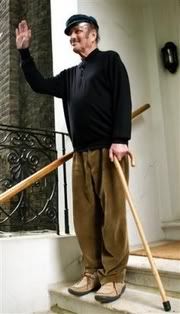
Well, Pinter got the Nobel. Was it just for his art or also because of his outspoken views on the U.S. involvement in and his opposition to Blair? He has long raged against
"... the nightmare of American hysteria, ignorance, arrogance, stupidity and belligerence; the most powerful nation the world has ever known effectively waging war against the rest of the world."One after my own heart, in other words.
I've been out of touch with what Pinter has been writing in more recent times I must confess (as my cheeks redden with bookguilt), but read his early plays while I was a student and they have inhabited my head ever since.
In fact every time I have a conversation with my husband I find myself thinking "Hmmm ... that little dialogue wouldn't be out of place in a Pinter play." Those of you who haven't a clue what I'm talking about better go read Pinter, and you will fathom it immediately.
Postscript:
The Elegant Variation has compiled an excellent list of Pinter links.
Banned Books
My bibliobibulous prose has reached the glossies! I have a piece in this months edition of new men's magazine chrome.
(SMART//SHARP//SEXY reads the cover. That of course refers to the writers. Too bad about the rest of you.)
There among the oiled torsos and designer stubble and the lip-glossed pouting pretty boys is my article They Ban Books, Don't They?
No prizes for guessing who the "they" is.
But what came as a huge surprise to me writing the article was just how many books simply do not make it onto the shelves of bookshops. Apart from the more high profile cases where organisations like the DAP or religious bodies kick up a fuss, no announcement is made about what is banned.
Anyway, I guess we must just accept that the Kementarian Keselematan Dalam Negeri (The Ministry of Internal affairs) has the interests of all Malaysians at heart. It would be too bad if you had access to information not sanctioned by a government body. Those in power are always wiser than you. They do not need to explain their actions.
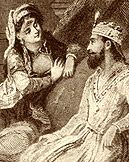 And yes, it would be terrible if you had access to banned books like Thousand and One Nights (a.k.a. The Arabian Nights). Don't, whatever you do, spend time here.
And yes, it would be terrible if you had access to banned books like Thousand and One Nights (a.k.a. The Arabian Nights). Don't, whatever you do, spend time here.
And please avoid taking a peek at Khalil Gibran's The Prophet . It has been banned in Malaysia since 1992, never mind that it has been described as "one of the most inspirational works to come from any modern poet in the Arab world". (Psssst, you want to buy a copy? Just e-mail me ...)
. It has been banned in Malaysia since 1992, never mind that it has been described as "one of the most inspirational works to come from any modern poet in the Arab world". (Psssst, you want to buy a copy? Just e-mail me ...)
 It's quite obvious too that Lady Chatterley's Lover is a corrupting influence. It doesn't matter that it is a tender love story which shows the spiritual and regenerative powers of sex. The authorities have decided that it is smut and out of bounds for you. There's a lot more sex in last year's Booker prize winner. Explicit gay sex into the bargain. Come to that, there is more sex in just about any novel you pick up nowadays. All of them should be banned.
It's quite obvious too that Lady Chatterley's Lover is a corrupting influence. It doesn't matter that it is a tender love story which shows the spiritual and regenerative powers of sex. The authorities have decided that it is smut and out of bounds for you. There's a lot more sex in last year's Booker prize winner. Explicit gay sex into the bargain. Come to that, there is more sex in just about any novel you pick up nowadays. All of them should be banned.
I end here due to sheer lack of energy, not from a shortage of books to talk about. If you want to read more you'll have to buy chrome.
(And if I can't tempt you, Dina Zaman has a great piece in it telling guys how to buy lingerie for their women. Lady Chatterley - eat your heart out!)
(SMART//SHARP//SEXY reads the cover. That of course refers to the writers. Too bad about the rest of you.)
There among the oiled torsos and designer stubble and the lip-glossed pouting pretty boys is my article They Ban Books, Don't They?
No prizes for guessing who the "they" is.
But what came as a huge surprise to me writing the article was just how many books simply do not make it onto the shelves of bookshops. Apart from the more high profile cases where organisations like the DAP or religious bodies kick up a fuss, no announcement is made about what is banned.
Anyway, I guess we must just accept that the Kementarian Keselematan Dalam Negeri (The Ministry of Internal affairs) has the interests of all Malaysians at heart. It would be too bad if you had access to information not sanctioned by a government body. Those in power are always wiser than you. They do not need to explain their actions.
 And yes, it would be terrible if you had access to banned books like Thousand and One Nights (a.k.a. The Arabian Nights). Don't, whatever you do, spend time here.
And yes, it would be terrible if you had access to banned books like Thousand and One Nights (a.k.a. The Arabian Nights). Don't, whatever you do, spend time here.And please avoid taking a peek at Khalil Gibran's The Prophet
 . It has been banned in Malaysia since 1992, never mind that it has been described as "one of the most inspirational works to come from any modern poet in the Arab world". (Psssst, you want to buy a copy? Just e-mail me ...)
. It has been banned in Malaysia since 1992, never mind that it has been described as "one of the most inspirational works to come from any modern poet in the Arab world". (Psssst, you want to buy a copy? Just e-mail me ...) It's quite obvious too that Lady Chatterley's Lover is a corrupting influence. It doesn't matter that it is a tender love story which shows the spiritual and regenerative powers of sex. The authorities have decided that it is smut and out of bounds for you. There's a lot more sex in last year's Booker prize winner. Explicit gay sex into the bargain. Come to that, there is more sex in just about any novel you pick up nowadays. All of them should be banned.
It's quite obvious too that Lady Chatterley's Lover is a corrupting influence. It doesn't matter that it is a tender love story which shows the spiritual and regenerative powers of sex. The authorities have decided that it is smut and out of bounds for you. There's a lot more sex in last year's Booker prize winner. Explicit gay sex into the bargain. Come to that, there is more sex in just about any novel you pick up nowadays. All of them should be banned.I end here due to sheer lack of energy, not from a shortage of books to talk about. If you want to read more you'll have to buy chrome.
(And if I can't tempt you, Dina Zaman has a great piece in it telling guys how to buy lingerie for their women. Lady Chatterley - eat your heart out!)
Thursday, October 13, 2005
The Lexus and the Olive Tree at La Bodega
This blog seems to be getting updated hourly!
Here's an ad (and I don't even charge!) for my friend Fiona's book club:
Here's an ad (and I don't even charge!) for my friend Fiona's book club:
Book of the Month: The Lexus and The Olive Tree by Thomas Friedman
Date: October 17th, 2005 (Monday)
Time: 8.30pm
Venue: La Bodega Lounge, Bangsar Baru
My contact: 012 3241217
We're going to be discussing globalization - this book is so superb!
When I first saw it on the shelf I was daunted by the topic but Friedman makes it understandable for the lay-don't-know-much-about-current-affairs person such as me.
Now Accepting Bets For The Nobel
If having torn up our Booker betting slips (while the bookies gleefully rub their hands together at Banville's unexpected win) you have withdrawal symptoms, Old Hag points that it's time to lay your bets for ther next big one - the Nobel Prize for Literature.
I checked for the latest odds at Ladbrokes and they looked like this:
It's great to see this part of the world represented by Indonesian Pramoedya Ananta Toer , but my loyalties are seriously divided because Kundera and DeLillo are on the list too!
I checked for the latest odds at Ladbrokes and they looked like this:
Adonis 2.75
Joyce Carol Oates 8.00
Philip Roth 10.00
Thomas Transtromer 10.00
Ko un 13.00
Milan Kundera 13.00
Claudio Magris 15.00
Hugo Claus 15.00
Orhan Pamuk 15.00
Pramoedya Ananta Toer 15.00
Antoni Tabucchi 21.00
Harold Pinter 21.00
Ryszarda Kapuscinskiego 21.00
Amos Oz 26.00
Cees Nooteboom 26.00
Jean Marie Gustav Le Clezio 26.00
Don DeLillo 34.00
Inger Christensen 34.00
Eeva Kilpi 101.00
It's great to see this part of the world represented by Indonesian Pramoedya Ananta Toer , but my loyalties are seriously divided because Kundera and DeLillo are on the list too!
A Toast To Mr. Wong
How would you like to spend a year, all expenses paid, at the University of East Anglia doing the M.A. in Creative Writing? The only catch is that you need to be working on a novel about South East Asia.
The 2004 fellow was Thai/American writer Rattawut Lapcharoensap who's doing pretty well for himself.
Well, now I've told you just go for it! And if you're thinking to yourself, I don't need to learn to be a better writer, I say the course is not so much about learning to write as about making the right contacts and getting your foot in the door.
As if that news is not enough, here's something else that should interest you.
The David TK Wong Fellowship is a unique and generous annual award - £25,000 to enable a fiction writer who wants to write in English about the Far East to spend a year in the UK, at the University of East Anglia in Norwich.Yes, I did a double take when I spotted this information posted up on the British Council's Animating Literature website. Did our friend, already there and bravely self-financed know about this? Did Tash?
The Fellowship is named for its sponsor Mr. David Wong, a retired Hong Kong businessman, who has also been a teacher, journalist and senior civil servant, and is a writer of short stories himself.
The shortlisted entries will be judged by a distinguished international panel, and since there will be no interviews, candidates will be judged entirely on the quality and promise of their writing, and the project they describe. There is no age limit, and no means test of any kind.
The 2004 fellow was Thai/American writer Rattawut Lapcharoensap who's doing pretty well for himself.
Well, now I've told you just go for it! And if you're thinking to yourself, I don't need to learn to be a better writer, I say the course is not so much about learning to write as about making the right contacts and getting your foot in the door.
As if that news is not enough, here's something else that should interest you.
THE DAVID T K WONG PRIZE FOR SHORT FICTIONFurther details (and how can you resist this?) here.
International PEN is delighted to announce a new prize to promote literary excellence in the form of the short story and to further the awareness of and support for the ideals of PEN worldwide. Unpublished stories, written in English, are welcome from writers world-wide but stories must incorporate one or more of International PEN's ideals as set out in its Charter. Since the prize also hopes to help raise funds for individual centres, entries should not be sent direct to International PEN but should be submitted via the entrant's local PEN Centre.
The first prize is £7,500.
Wednesday, October 12, 2005
Booker Bores
Aiyolah! The spillover. The venom. The agonising post-mortem ...
I'm truly sorry for all my regular readers who are scratching their heads and wondering what on earth is the big deal with this Booker business which may not seem very important to most folks - enthusiastic readers even - in this part of the world. (Don't think I don't see my counter numbers dropping ...)
But I'm gonna be a Booker bore and chuck more links at you just so you can see how things are being chewed up and down both here and there. I am throroughly enjoying the debate.
Start at the Independent where Boyd Tonkin has declared the decision of the Man Booker Prize committee:
Then Subtext Whore finds the whole 2005 shortlist sadly lacking compared to the books that made it through last year ... Most inspired line:
Certainly not and probably not are my answers. Very very very sadly. We have to do something.
Hari proposes that dear old Raman, superhero of the literary universe should initiate our own literary award "The Silvers". What is this Hari trying to stir up, hey?
Anyway, I'm posting this just before bed and no doubt by the morning there will be a tidal wave of opinions to cope with.
And this really is the fun. More than the bloody books!
I'm truly sorry for all my regular readers who are scratching their heads and wondering what on earth is the big deal with this Booker business which may not seem very important to most folks - enthusiastic readers even - in this part of the world. (Don't think I don't see my counter numbers dropping ...)
But I'm gonna be a Booker bore and chuck more links at you just so you can see how things are being chewed up and down both here and there. I am throroughly enjoying the debate.
Start at the Independent where Boyd Tonkin has declared the decision of the Man Booker Prize committee:
the worst, certainly the most perverse, and perhaps the most indefensible choice in the 36-year history of the contestHe hurls plenty of invective Banville-ward:
icy and over-controlled exercise in coterie aestheticism ... chilly perfection of a waxwork model ... glacial evocation ... lifeless, pallid work ...You didn't like it then, Mr. Tonkin? But I can't blame him for being more than a little pissed off that Banville shredded McEwan's novel in The New York Review of Books and probably jeopardized the novel's chances ...
Then Subtext Whore finds the whole 2005 shortlist sadly lacking compared to the books that made it through last year ... Most inspired line:
Kazuo Ishiguro’s Never Let Me Go, yet another dystopic vision of cloning, reads like a nested story from Cloud Atlas, and seems less worthy because of it.And nearer home our own Hari Kingston chews over the issues arising ... with specific reference to our own peripheral literary status. Would Tash have got long-listed if he's chosen to publish here? Would he even have been published here?
Certainly not and probably not are my answers. Very very very sadly. We have to do something.
Hari proposes that dear old Raman, superhero of the literary universe should initiate our own literary award "The Silvers". What is this Hari trying to stir up, hey?
Anyway, I'm posting this just before bed and no doubt by the morning there will be a tidal wave of opinions to cope with.
And this really is the fun. More than the bloody books!
An Appropriated Language
Laughed at this quote from Banville in an Independent interview last month:
Peculiarly for Irish writers, English isn't really our language. We might have spoken it for 200 years, but we don't necessarily always feel at home in it. The problem for us Irish novelists is that we publish in London and are reviewed in England by English reviewers who often regard Irish novels as a failed attempt to be English. I read something the other day that referred to the 'Celtic fringe' of writers. I thought: Wilde, Shaw, Joyce, Yeats, Beckett - if this is the Celtic fringe, where would I find the full head of hair?
Winner-Take-All-Mechanism
A little cynicism about the Booker is called for says the Grumpy Old Bookman. The "merciless winner-take-all mechanism which accompanies this annual jamboree" does no-one any good he says in an essay reprinted from last year.
I actually think the Booker is a good thing. It gets readers thinking about, talking about, comparing books on the list. It creates a dialogue about what the novel is and where it's heading. But yes, we must keep a healthy sense of proportion about the whole procedings. There are other excellent novels on the shortlist. Other excellent novels on the longlist. And other excellent novels which did not make it to either.
When you and I are faced with a book, and asked to say whether it is a masterpiece or an overblown piece of self-indulgent nonsense, there is no universally recognised scale against which we can measure the book and come to a clear conclusion. Judging a book is a matter of taste and sensibility, and you are likely to maintain that your taste and sensibility are superior to mine. (You are probably right, since my taste is notoriously vulgar.)Yann Martell's win for Life of Pi in 2002 he points out was as flukey as hell, he says. But it's the fallout from the prize which most concerns him:
As far as the Booker Prize is concerned, it is safe to say that the choice of the ‘best’ book of the year is inevitably a matter of opinion rather than fact. And not even unanimous opinion. In almost every year there are press reports of disagreements among the judges, and in some years we hear of ‘compromise choices’ or the chairman’s casting vote. We also know that, in one particular case, the eventual winner was unusually ‘fortunate’.
... observe, please, what happens when the winner of the Booker Prize is announced (in any year). What happens is that the media, the critics, and the public, all behave as if there is some absolute sense in which the winner is the best book of the year. They act as if the book has been held up against a ruler, a universally agreed scale, and has been found, indisputably, and scientifically, to be ‘better’ than any other.And while the winner is feted, it's pretty much at the expense of other novels.
I actually think the Booker is a good thing. It gets readers thinking about, talking about, comparing books on the list. It creates a dialogue about what the novel is and where it's heading. But yes, we must keep a healthy sense of proportion about the whole procedings. There are other excellent novels on the shortlist. Other excellent novels on the longlist. And other excellent novels which did not make it to either.
Tuesday, October 11, 2005
Omigosh - Banville Won!
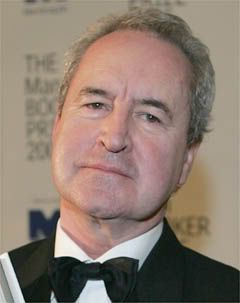
John Banville's The Sea won the Booker.
Am I surprised? Nope because the book is excellent. Because I feel Banville moves the novel into new territory - (as I said in an earlier post, can't think of another writer who has captured memory as beautifully as this writer).
So yes, I'm happy with the decision.
And for most readers, I don't think the book is as enjoyable a read as others on the list. It's beautifully written sure - but slow and meandering and melancholy.
According to The Financial Times chairman of the panel, John Sutherland:
... commented on the judges’ debate with the usual politesses – “civilised argument”, “closely contested” etc – but paid eloquent tribute to the winner’s “masterly” and “virtuoso” writing. The Sea is an elegy of grief and love remembered: Sutherland dramatically referred to it as a “slit-your-throat” novel, but its prevailing mood is melancholy.This is the way the voting went in the People's Booker:
498 for Kazuo IshiguroIf you're the kind of reader who values good storytelling above style - go for the Barnes or the Ishiguro or Zadie Smith because you will enjoy yourself much more.
430 for Julian Barnes
240 for Zadie Smith
198 for Ali Smith
181 for John Banville
132 for Sebastian Barry
Postscript:
If you can bear any more about Banville, nice piece from the Guardian . Apparently Banville is a very difficult guy to live with when he's writing. His demeanor is compared to that of "a murderer who's just come back from a particularly bloody killing".
Monday, October 10, 2005
When To Stop Making Excuses
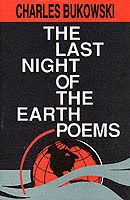 I bought The Last Night of the Earth Poems by beat poet Charles Bukowski because the following poem jumped out from between the pages and bit me. As it should do you, if you always put off your writing because circumstances are not quite right. Pin this one up by your writing desk.
I bought The Last Night of the Earth Poems by beat poet Charles Bukowski because the following poem jumped out from between the pages and bit me. As it should do you, if you always put off your writing because circumstances are not quite right. Pin this one up by your writing desk. air and light and time and space
"–you know, I’ve either had a family, a job,
something has always been in the
way
but now
I’ve sold my house, I’ve found this
place, a large studio, you should see the space and
the light.
for the first time in my life I’m going to have
a place and the time to
create."
no baby, if you’re going to create
you’re going to create whether you work
16 hours a day in a coal mine
or
you’re going to create in a small room with 3 children
while you’re on
welfare,
you’re going to create with part of your mind and your body blown
away,
you’re going to create blind
crippled
demented,
you’re going to create with a cat crawling up your
back while
the whole city trembles in earthquake, bombardment,
flood and fire.
baby, air and light and time and space
have nothing to do with it
and don’t create anything
except maybe a longer life to find
new excuses
for.
© Charles Bukowski, Black Sparrow Press
Subscribe to:
Comments (Atom)
